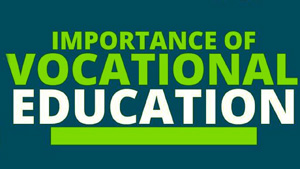Are you curious about vocational technical education? Wondering what it entails and how it can benefit you? In this article, we will explore the world of vocational technical education and shed light on its significance in today’s job market.

Image by istockphoto
Importance of vocational technical education
Vocational technical education, also known as career and technical education (CTE), is of paramount importance in today’s society. It plays a crucial role in equipping individuals with practical skills and knowledge that are essential for specific careers or trades. Unlike traditional education, which focuses primarily on theoretical knowledge, vocational technical education centers on hands-on experience and training.
One of the key advantages of vocational technical education is its ability to provide students with the skills they need to enter the workforce immediately. This is particularly valuable in industries where there is a high demand for skilled workers. By offering specialized training in fields such as automotive technology, culinary arts, healthcare, construction, and more, vocational technical education prepares individuals to meet the needs of the job market.
Vocational technical education also serves as a stepping stone for further education. Many individuals who complete vocational technical programs choose to continue their studies at a higher level, such as pursuing a degree or certification in their chosen field. This combination of practical skills and academic qualifications makes graduates highly sought after by employers.
Vocational technical education vs. traditional education
While traditional education focuses on providing a broad range of knowledge across various subjects, vocational technical education takes a more specialized approach. It caters to individuals who have a clear career path in mind and want to acquire specific skills related to their chosen field.
Traditional education often emphasizes academic achievement and prepares students for college or university. On the other hand, vocational technical education focuses on practical training and prepares students for immediate entry into the workforce. It provides individuals with the necessary skills to perform specific job roles, making them attractive candidates for employers.
Another significant difference lies in the teaching methods used in each type of education. Traditional education relies heavily on classroom-based learning, lectures, and exams, whereas vocational technical education adopts a more hands-on approach. Students in vocational technical programs spend a considerable amount of time in workshops or labs, gaining practical experience under the guidance of industry professionals.
Types of vocational technical education programs
Vocational technical education offers a wide range of programs catering to different industries and career paths. Here are some of the most popular types of vocational technical education programs:
Automotive technology
This program focuses on training individuals to become skilled automotive technicians. Students learn about vehicle maintenance, repair, and diagnostics, preparing them for a career in the automotive industry.
Culinary arts
For those with a passion for cooking and the culinary arts, this program provides training in various aspects of food preparation, presentation, and management. Graduates can pursue careers as chefs, pastry chefs, or restaurant managers.
Healthcare
Vocational technical education programs in healthcare offer training for various roles in the healthcare industry, such as medical assistants, dental hygienists, pharmacy technicians, and veterinary technicians. These programs combine classroom instruction with practical training in healthcare settings.
Construction
Construction programs focus on training individuals in various aspects of the construction industry, including carpentry, plumbing, electrical work, and masonry. Students gain hands-on experience in construction techniques and learn how to read blueprints and use tools and equipment.
Information technology
With the increasing reliance on technology in today’s world, vocational technical education programs in information technology are in high demand. These programs cover areas such as computer networking, programming, cybersecurity, and web development.
These are just a few examples of the many vocational technical education programs available. It’s important to note that the availability of programs may vary depending on the region or country.
Advantages of vocational technical education
Vocational technical education offers several advantages that make it an appealing choice for individuals considering their career options. Here are some key advantages:
Practical skills
Vocational technical education focuses on teaching practical skills that are directly applicable to specific job roles. This hands-on approach ensures that graduates are job-ready and can immediately contribute to the workplace.
Shorter duration
Unlike traditional academic programs that can take several years to complete, vocational technical education programs are often shorter in duration. This allows individuals to enter the workforce more quickly and start earning a living.
Job opportunities
With a growing demand for skilled workers in various industries, vocational technical education provides individuals with a wide range of job opportunities. Graduates are sought after by employers who value their specialized skills and practical experience.
Higher earning potential
Due to the specialized nature of vocational technical education, graduates often enjoy higher earning potential than those with a general education. The skills they acquire are in high demand, and employers are willing to pay a premium for their expertise.
Personal fulfillment
Vocational technical education allows individuals to pursue their passion and interests. By focusing on a specific career path, individuals can find fulfillment in their work and enjoy a sense of accomplishment.
Vocational technical education and career opportunities
Vocational technical education opens doors to a wide range of exciting and fulfilling career opportunities. Graduates of vocational technical programs are well-positioned to enter industries that are experiencing a shortage of skilled workers.
In the automotive industry, for example, individuals with vocational technical training can find employment as automotive technicians, service advisors, or parts specialists. They may work in dealerships, independent repair shops, or specialized service centers. The demand for skilled automotive technicians continues to grow as technology advances and vehicles become more complex.
The culinary arts industry also offers numerous career paths for vocational technical education graduates. They can work in restaurants, hotels, catering companies, or even start their own culinary businesses. With the rise of food tourism and the popularity of cooking shows, the demand for skilled chefs and culinary professionals is on the rise.
The healthcare industry is another sector that offers abundant career opportunities. Vocational technical education graduates can work as medical assistants, dental hygienists, pharmacy technicians, or veterinary technicians. These roles are essential in providing quality healthcare services and supporting the work of doctors, dentists, pharmacists, and veterinarians.
The construction industry is experiencing a significant demand for skilled workers. Graduates of vocational technical education programs in construction can work as carpenters, plumbers, electricians, or masons. They may find employment in construction companies, homebuilding firms, or as independent contractors.
Information technology is a rapidly growing field that offers numerous career paths for vocational technical education graduates. They can work as network administrators, software developers, cybersecurity analysts, or web developers. The demand for skilled IT professionals is expected to continue rising as technology continues to evolve.
These are just a few examples of the many career opportunities available to vocational technical education graduates. The specific career paths may vary depending on the program and industry, but the underlying principle remains the same – vocational technical education prepares individuals for rewarding and stable employment.
Challenges and misconceptions about vocational technical education
While vocational technical education offers numerous benefits, it is not without its challenges and misconceptions. One of the key challenges is the perception that vocational technical education is inferior to traditional academic programs. This misconception often stems from societal biases that value academic achievement over practical skills.
However, the reality is that vocational technical education plays a vital role in meeting the demands of the job market. Skilled workers are needed in industries such as healthcare, construction, and automotive technology, and vocational technical education provides the necessary training to fill these roles. It is essential to recognize that both academic and vocational technical education are valuable and serve different purposes.
Another challenge is the lack of awareness and information about vocational technical education programs. Many individuals are not familiar with the range of options available or the potential career paths they can pursue through vocational technical education. It is crucial to provide comprehensive guidance and support to students and individuals considering vocational technical education as a viable career option.
Funding and resources for vocational technical education programs can be limited in some regions. This can result in a lack of facilities, outdated equipment, or insufficient instructor-to-student ratios. To address these challenges, it is essential for governments, educational institutions, and industry stakeholders to collaborate and invest in vocational technical education.
Vocational technical education in different countries
Vocational technical education is not limited to a specific country or region. It is a global phenomenon that exists in various forms worldwide. Different countries have different approaches to vocational technical education, depending on their cultural, economic, and educational systems.
In Germany, for example, the dual system of vocational training is highly regarded. It combines classroom instruction with on-the-job training, allowing students to gain both theoretical knowledge and practical experience. This system has been successful in producing a highly skilled workforce that meets the demands of the German economy.
In the United States, vocational technical education is often offered through vocational schools, community colleges, and technical institutes. These institutions provide specialized training in various fields, preparing students for specific careers. Some states have established partnerships between schools and local businesses to ensure that vocational technical education aligns with industry needs.
In Singapore, vocational technical education is known as the Institute of Technical Education (ITE). ITE offers a wide range of vocational courses and apprenticeships that cater to different industries. The emphasis is on equipping students with the skills and knowledge needed to meet the needs of the workforce.
These are just a few examples of how vocational technical education is implemented in different countries. While the specific systems and programs may vary, the underlying goal remains the same – to provide individuals with the skills and knowledge they need to succeed in the workforce.
Vocational technical education resources and support
If you are considering vocational technical education, it is essential to have access to resources and support that can help you make informed decisions. Here are some valuable resources and support systems to consider:
Career guidance counselors
These professionals can provide guidance and advice on vocational technical education programs, career pathways, and job prospects. They can help you explore your interests, aptitudes, and goals to find the most suitable vocational technical education program for you.
Vocational technical schools and institutes
These educational institutions offer a variety of vocational technical education programs. They often have career services departments that can assist you with job placement, internships, and apprenticeships.
Industry associations and organizations
Many industries have associations and organizations that provide resources, networking opportunities, and support for individuals interested in vocational technical education. These associations can connect you with industry professionals, provide information on industry trends, and offer scholarships or grants.
Online resources and platforms
The internet is a vast source of information on vocational technical education. Websites, forums, and online communities can provide insights into different programs, career paths, and job opportunities. Online learning platforms also offer courses and certifications in various vocational technical fields.
Government support
In many countries, the government offers support for vocational technical education through grants, scholarships, or subsidies. Research government programs and initiatives that can help finance your vocational technical education.
By utilizing these resources and support systems, you can make informed decisions about your vocational technical education journey and ensure that you have the necessary tools to succeed.
Conclusion
Vocational technical education, with its focus on practical skills and specialized training, offers individuals a pathway to rewarding careers and stable employment. Whether you’re a high school student exploring career options or an adult looking to switch careers, vocational technical education can open doors to exciting and fulfilling job prospects.
If you’re considering vocational technical education, take the time to research the programs available in your area, explore different career paths, and seek guidance from career professionals. By investing in vocational technical education, you can acquire valuable skills, expand your career opportunities, and shape a successful future.




